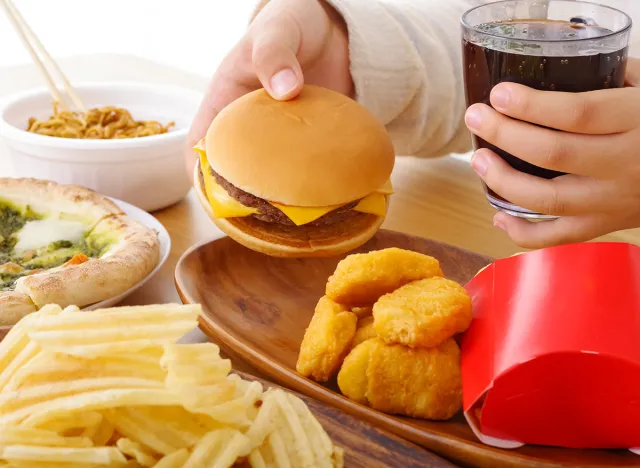Woman Gave Up Junk Food for 2 Months and Here's What Happened to Her Body
We've all been there — craving that late-night snack or quick convenience food. For Melanie Murphy, an Irish author and YouTuber, these cravings were more than occasional indulgences. They were the start of a 15-year struggle with disordered eating and food addiction. "I was addicted to industrially produced edible food-like substances," Melanie admits. "Pop-Tarts, Pringles, sausage rolls, and Coca-Cola were my weaknesses." But what happens when you decide to quit ultra-processed foods cold turkey? Read on to discover Melanie's surprising journey and how it might inspire your own health transformation.
The Dangers of Ultra-Processed Foods
Before diving into Melanie's story, it's crucial to understand the scale of the problem. According to a recent study, eating higher levels of ultra-processed foods shortens life space. The risk increases up to 14 percent for women and 15 percent for men. The study found that people who ate ultra-processed foods were 10 percent more likely to die from heart disease or diabetes compared to those in the bottom 10 percent. It also found that people who consumed most of these types of food were generally younger and heavier.
The study did note that even those who were at normal weight and generally consumed a healthy diet were not immune to the risk of consuming ultra-processed foods. They, too, were at a higher risk of early death.
"Our study results support a larger body of literature, including both observational and experimental studies, which indicate that ultra-processed food intake adversely impacts health and longevity," said lead author Erikka Loftfield, an investigator at the National Cancer Institute in Bethesda, Maryland. "However, there is still a lot that we don't know, including what aspects of ultra-processed foods pose potential health risks."
Melanie's Health Scare and Two-Month Challenge
After a health scare in February, Melanie found herself unable to eat most foods. As she recovered, she craved only whole foods like eggs, parsnips, and organic steak. This unexpected shift led her to embark on a two-month journey of eating only whole, unprocessed foods. "I was kind of just eating a lot of those things over and over again with loads of pink salt," Melanie recalls in her post. "I felt like I was being so nourished. It was like my dead granny was just hugging me and feeding me the stews she used to make on a Sunday."
The Surprising Benefits of Quitting UPFs
The results were dramatic. "It was like this kind of brain fog veil was lifted away," Melanie recounts. She experienced less joint pain, better sleep, stable energy levels, improved skin, and significant weight loss. "I lost nearly another 10 pounds since then. And it's just continually, just very slowly. It's like inflammation is going or something," she marvels.
Improved Energy and Physical Stamina
Other improvements included better digestion and increased physical stamina. "After my COVID, I was just in bits. I couldn't even clean the kitchen without getting out of breath. I was that sick," Melanie shares. "Now, I've regained my ability to go for fast walks, and I'm doing yoga and all this kind of stuff."
The Challenges of Whole Food Eating
While the health benefits were clear, Melanie acknowledges the difficulties of this lifestyle change. "The hard part is being prepared," she admits. "Having the house stocked up with this stuff, having stuff prepared to take with me places." She also notes the social challenges, including judgment from others.
A New Perspective on Food and Health
Melanie's experience has changed her relationship with food. "My taste buds feel like they've changed," she says. Simple whole foods now taste incredibly satisfying to her. More importantly, her focus has shifted from weight to overall health. "It's about the feeling, how I feel. I feel so healthy. I feel healthier than I have in maybe ten years."
RELATED: 13 Popular Drinks Ranked From Least to Most Harmful
Warning Signs You May Be Eating Too Many Processed Foods

While Melanie's journey is inspiring, it's important to recognize the signs that you might be consuming too many processed foods. According to preventive cardiologist Stephen Devries, MD, "Recent data shows that 57% of caloric intake in adults comes from ultra-processed foods. For children, it's sadly even higher, with 67% of their daily calories coming from relatively empty, ultra-processed foods." Here are some warning signs to watch out for:
Unexplained Weight Gain
If you're struggling with weight gain despite your best efforts, processed foods might be the culprit. Dr. Devries explains, "Ultra-processed foods are the perfect storm to promote overconsumption and weight gain. They are laboratory engineered to maximize appeal, are calorie-dense, and have little or no fiber or other healthful nutrients."
Constant Thirst
Finding yourself constantly reaching for water? The Mayo Clinic warns that processed foods often contain high levels of sodium. "As it turns out, you don't even need to [add salt] because manufacturers have already added salt for you — and too much, in fact." This excess sodium can lead to persistent thirst.
Frequent Headaches
If you're experiencing more headaches than usual, your diet might be to blame. West Tennessee Healthcare reports, "Around 5% of people with migraines may develop a headache shortly after consuming processed meat products." These "hot dog headaches" are thought to be caused by nitrites, common preservatives in processed meats.
Persistent Bloating
Feeling bloated more often than not? Stacy Loudon, ACSM-CPT, explains, "Many processed foods are high in sodium, which makes your body retain water and can cause your stomach to feel bloated. Sugary foods and snacks break down in your body and can make you gassy."
Skin Problems
Your diet could be affecting your skin. The American Academy of Dermatology notes, "If you're like most Americans, you consume plenty of high-glycemic foods and beverages. These foods and beverages raise your blood sugar quickly." This rapid rise in blood sugar can lead to skin issues.
High Blood Sugar
Processed foods can significantly impact your blood sugar levels. Harvard Health reports, "The risk for developing diabetes went up 15% for a 10-percentage-point increase in the amount of ultra-processed food in the diet." This increased risk persists even after accounting for other known risk factors.
Constant Fatigue
If you're always tired despite getting enough sleep, your diet might be the issue. Samantha Cassetty, RD, tells TODAY, "If you experience an afternoon slump or just feel tired a lot of the time despite getting enough sleep, it's possible your eating habits are contributing to low energy levels. Heavily processed and sugary foods are some of the biggest dietary culprits that can lead to fatigue."
Poor Sleep Quality
Your diet can affect your sleep more than you might think. Harvard Health reports, "Researchers found that eating an unhealthy diet high in processed food can affect people's deep sleep (also known as slow-wave sleep)." This crucial sleep stage is when your body repairs and regenerates tissues.
Constant Hunger
If you find yourself always hungry, ultra-processed foods might be to blame. Dr. Amy Shah tells CNBC, "Unbeknownst to many people, the foods we buy have a lot of toxic additives lurking in them. This means they've been altered in ways that actually make you hungrier and hijack the brain to worsen your emotional eating habits."
In conclusion, while Melanie's journey from food addiction to vibrant health through whole foods is inspiring, it's important to be aware of how processed foods might be affecting your own health. By recognizing these warning signs, you can take the first step towards a healthier diet and potentially experience the same transformative benefits that Melanie did. And if you enjoyed this article, take advantage of these 15 Quick Ways to Lose Body Fat Percentage in a Week.





